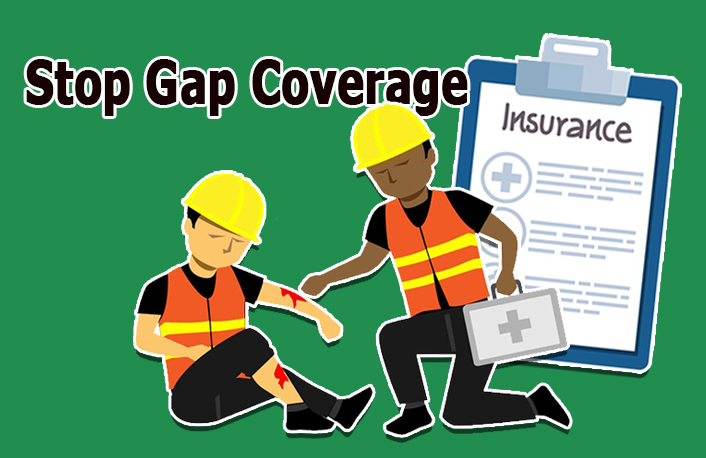If your workers sustained an injury while performing duties, workers’ compensation might be beneficial if it’s available regardless of who’s at fault. For this reason, the injured worker will not sue his or her employer in exchange for these benefits. However, the employer may be still responsible and be subject to legal actions if workers’ compensation is the only alternative available for settling worker’s injuries. This is where Stop Gap Coverage comes in place to secure the employer against future lawsuits.

Stop-gap coverage is a kind of insurance that offers financial coverage to companies or self-insured organizations against worker lawsuits. This coverage is also known as excess loss or stop loss insurance. Generally, you can obtain it separately to cover the gaps in workers’ compensation as it comes with the employee health plans. Furthermore, if an employer lacks workers’ compensation, they may need to cover costs that did not receive coverage from insurance.
How Does Stop Gap Coverage Work
Workers’ compensation provides compensation to workers who sustain injuries or illnesses, covering medical bills, lost income, and other covered expenses. However, monopolistic states have varying rules for workers’ compensation, requiring businesses to legally purchase coverage from the state fund. However, there might be some incidents that restrict coverage especially when the employers’ liability insurance does not receive coverage.
This is where stop-gap coverage comes in place. This policy offers coverage to workers against incidents that workers’ compensation cannot cover. Furthermore, this is not mandatory if an employer’s liability coverage is included when buying workers’ compensation insurance.
Is Stop Gap Coverage Mandatory
Most states require workers’ compensation, so individuals need to consider the importance of stop-gap coverage for their businesses. This coverage is not required by law, but it is essential for all business owners. This insurance protects employers from potential claims made by employees or relatives as a result of workplace illnesses or injuries. If a legal emergency arises, you are responsible for covering the costs yourself.
When Do I Need Stop Gap Coverage
Entrepreneurs in states without employers’ liability insurance must obtain temporary coverage. For example, if you live in North Dakota and do not have liability insurance, it is necessary to obtain stop-gap coverage. Workers’ compensation coverage protects against claims for incomplete medical expenses and lost income by a worker who sustains an injury on duty and files a claim against you.
What Are the Monopolistic States
There are four monopolistic states available. Employers in each state must have workers’ compensation from a state fund. Also, you cannot purchase this coverage from a private insurance company.
The following monopolistic states include;
- North Dakota.
- Ohio.
- Washington.
- Wyoming.
Plans acquired through monopolistic state funds can aid workers in recovery after work-related illnesses or injuries. However, employer liability insurance, which helps cover lawsuits, will not receive coverage.
What Does Stop Gap Coverage Not Cover
It’s very crucial to know about the exclusions when looking for stop-gap coverage. Furthermore, stop-gap coverage excludes coverage for intentional, illegal, and fraudulent behavior.
Intentional act
This policy does not cover illnesses or bodily harm that an employer purposefully causes to a worker. Furthermore, it applies when an employer’s actions result in bodily harm in an accident or illness.
Illegal acts
Coverage does not cover sickness or injuries that are caused by illegal activities or breaking the law by the employer or workers. Furthermore, any assessment, fine, or penalty that a regulatory body imposes on the employer is not covered.
Fraudulent behaviors
If an employer participates in fraudulent activities with workers’ compensation claims, you will not get the coverage. Also, rules that are set by laws concerning unemployment compensation, disability benefits, workers’ compensation, or any other comparable laws are not covered.
Employment practices liability
Stop-gap coverage is made to offer liability coverage for workers who are either sick or injured while working. Also, this coverage does not cover claims concerning liability for employment practices. This may include discrimination, harassment, wrongful termination, and other disputes involving the workplace.
Liabilities outside of workers’ compensation
Stop-gap insurance only covers workers’ compensation-related liabilities and excludes risks or liabilities unrelated to workplace illnesses and injuries.
Most employers will not have to worry about these exclusions as long as their company operates legally and in the best interests of their employees.
How to Get Stop Gap Coverage
An insurance company may offer you an endorsement for stop-gap liability insurance. To add their general liability insurance coverage, small business owners can obtain a business insurance endorsement. Furthermore, general liability insurance offers coverage to your company from lawsuits alleging that caused someone else’s property damage or bodily damage.

